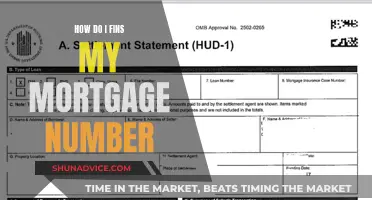
Keeping on top of your mortgage payments is a challenge for many, but there are ways to lower your monthly payments and free up funds for other financial commitments. The simplest way to lower your mortgage payment is with a refinance, especially when rates are dropping. However, this may not be the right option for everyone, as it can sometimes cause monthly payments to increase. Other options include extending your loan term, buying mortgage discount points, and eliminating private mortgage insurance (PMI).
What You'll Learn

Avoid escrow accounts
Escrow accounts are a common requirement for mortgage loan transactions. They are a designated account where a borrower pays a few hundred dollars extra each month on top of their mortgage payment of principal and interest. The additional money is kept in the escrow account and used to pay property tax and homeowners' insurance bills when they are due.
Some borrowers like the ease of having an escrow account as it helps them budget for large expenses and avoid worrying about paying large amounts when the tax or insurance bill comes due. However, some homeowners prefer to pay these bills themselves.
If you want to remove an escrow account from your mortgage, you need to meet specific criteria depending on your loan type. For example, if you have a "`higher-priced` mortgage loan, the escrow account must continue for at least five years. After five years, you can cancel the escrow account if the unpaid balance of the loan is less than 80% of the original value of the property and you have no delinquent payments. Every lender has different terms for getting rid of an escrow account, so it's important to contact your loan servicer to find out if you qualify for a deletion.
Removing an escrow account can lower your monthly mortgage payments and give you more control over when you pay your property taxes and insurance premiums. However, it's important to consider the potential challenges of budgeting for large, lump-sum property tax and insurance bills. There is also a risk that you might spend the money needed for taxes and insurance before the payments are due.
Finding the Right Mortgage: A Guide to Home Loans
You may want to see also

Refinance to a lower interest rate
Refinancing your mortgage can be a great way to secure a lower interest rate and reduce your monthly payments. It involves paying off your existing loan and replacing it with a new one, which can be beneficial if you can get a significantly lower rate. This can happen if interest rates have dropped since you took out your first mortgage or if your credit score has improved, allowing you to qualify for better loan terms.
When considering refinancing, it's important to evaluate the costs involved. Refinancing can cost between 5% and 7% of a loan's principal, and you may need to pay for an appraisal, title search, and application fees. Additionally, some lenders may charge a penalty for early repayment of your original mortgage. Therefore, it's crucial to compare the savings from a lower interest rate with the costs of refinancing to determine if it is financially worthwhile.
To find the best refinance option, it's recommended to get rate quotes from multiple lenders, ideally on the same day, to ensure an accurate comparison. Lenders determine interest rates based on your credit score, debt-to-income ratio, and other factors. By comparing the interest rate and annual percentage rate (APR), which includes the interest rate and other costs, you can make an informed decision.
Refinancing to a fixed-rate mortgage can also help you avoid future interest rate hikes associated with adjustable-rate mortgages (ARMs). This provides stability and ensures that your monthly payments won't increase due to rising interest rates. However, it's important to note that refinancing may not eliminate all potential increases in your monthly payments, as other factors, such as property taxes or insurance, can still cause fluctuations.
In addition to lowering your interest rate, refinancing can also provide other benefits. You may be able to adjust the term length of your mortgage, shortening it to pay off the loan faster or extending it to reduce monthly payments. Refinancing can also allow you to tap into your home equity, providing access to cash for renovations, college tuition, or other significant expenses.
Finding Out Someone's Mortgage Balance: Strategies and Steps
You may want to see also

Shop around for better insurance
Shopping around for better insurance is a great way to keep your mortgage from increasing. Here are some reasons why you should consider switching your homeowners insurance provider:
Improved Customer Experience and Better Coverage
You may find a new provider that offers a more positive and responsive customer service experience. Additionally, you can explore options that provide better coverage, ensuring that you and your home are adequately protected.
Fairer Price and Cost Savings
Shopping around allows you to find a policy with a fairer price, helping you save money on your insurance premiums. Lower premiums can contribute to lowering your overall home expenses. You may even be able to increase your coverage while still staying within your budget.
Building a Relationship with a Trusted Insurer
By shopping around, you have the opportunity to build a strong relationship with an insurer that you trust. This can provide peace of mind and ensure that you feel valued as a customer.
Annual or Semi-Annual Policy Review
Insurance experts recommend conducting a review of your policy at least once a year. This is because your coverage needs can change over time, and you want to ensure that your policy remains aligned with your needs.
No Practical Downside
Requesting home insurance quotes does not lock you into any agreement or commitment. It will not hurt your credit score, and the only cost is the time invested. Working with an independent agent or broker can help streamline this process.
Specialized Coverage
Your circumstances may change, and you may find that you require higher coverage limits or specialized coverage. Shopping around allows you to discover insurers who can provide tailored solutions to meet your evolving needs.
In summary, shopping for better insurance rates and coverage is a proactive step you can take to manage your mortgage and overall financial health. It empowers you to make informed decisions, save money, and ensure adequate protection for your home.
Who Owns Your Mortgage? Trace Your Mortgage Backers
You may want to see also

Cancel private mortgage insurance
One way to keep your mortgage from going up is to cancel your private mortgage insurance (PMI). PMI is unique to conventional loans and can be avoided by making a down payment of 20% or more. Your lender must automatically remove PMI when your loan-to-value (LTV) ratio reaches 78% or 80%. This usually happens when you've achieved 20% equity in your home. You can increase your home's equity by making extra loan payments.
If you can't wait until you've reached 20% equity, you can make additional principal payments or get an appraisal if you believe your home's value has increased. You can also refinance your mortgage to a new loan with a lower rate. However, refinancing can be costly, so be sure to shop around for refinance lenders. If you refinance and reach 20% equity with the new loan, your PMI will be removed.
It's important to keep track of your PMI cancellation schedule and your lender's requirements. You can request a written copy of this information from your lender. If you run into obstacles when trying to cancel PMI, you can complain to the Consumer Financial Protection Bureau.
Strategies to Overcome Mortgage Debt Problems
You may want to see also

Make a larger down payment
Making a larger down payment has several advantages. Firstly, it can help you avoid paying private mortgage insurance (PMI), which is unique to conventional loans. By making a down payment of 20% or more, you can eliminate the need for PMI altogether. This can result in significant savings over the life of the loan.
Another benefit of a larger down payment is that it can lead to lower interest rates and fees. When you borrow less money, you have less to pay back, leaving you with more cash flow for other expenses. Additionally, a larger down payment can improve your loan terms by demonstrating your financial stability and motivation to the lender. This is especially beneficial if you have poor credit or are purchasing a luxury home, as it can help you secure better interest rates and increase your chances of obtaining a mortgage.
In a competitive real estate market, a higher down payment can make your offer more attractive to sellers. It demonstrates your ability to obtain financing and shows that you are a motivated and reliable buyer. This can be particularly advantageous if your offer is on the lower side, as a larger down payment can increase your competitiveness.
It's important to note that the decision to make a larger down payment depends on various factors, including your local real estate market, financial situation, and long-term goals. While a larger down payment has its benefits, there are also instances where putting less money down can be advantageous. Therefore, it's essential to carefully consider your options and choose the down payment strategy that aligns with your circumstances and objectives.
Accessing Your Mortgage Statement: A Quick Guide
You may want to see also
Frequently asked questions
There are a few ways to stop your monthly mortgage payments from increasing. These include refinancing your loan to a lower interest rate, shopping around for a better homeowners insurance policy, and eliminating mortgage insurance if possible. You can also keep your payments from increasing by paying any escrow shortage in a lump sum.
There are several reasons for an increase in monthly mortgage payments. One common reason is an increase in property taxes or homeowners insurance premiums, which are often paid through an escrow account. Another reason could be that you have an adjustable-rate mortgage (ARM), where the interest rate changes after a certain period, typically every 6 months to a year. Other reasons include changes in property value, loss of property tax exemptions, and increases in the cost of private mortgage insurance (PMI).
To lower your monthly mortgage payments, you can consider the following options:
- Refinance your mortgage to get a better interest rate or loan term.
- Compare and switch to a more affordable homeowners insurance policy.
- Cancel PMI if you have reached 20% equity in your home.
- Make larger principal payments to reduce the total interest on your loan.
- Take advantage of closing cost grants offered by lenders to reduce upfront costs.







